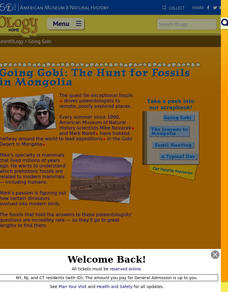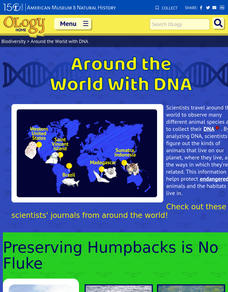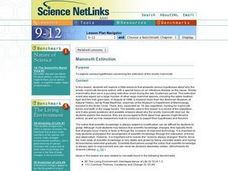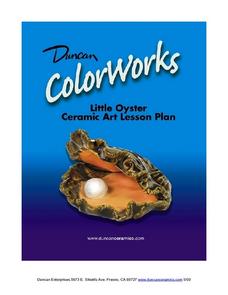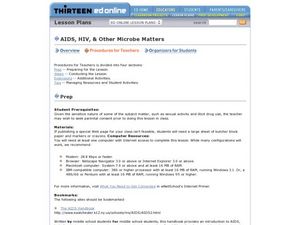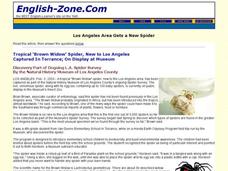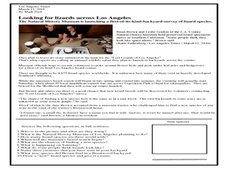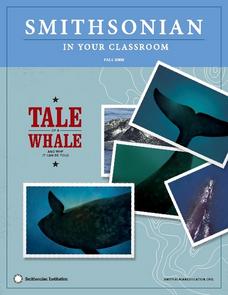American Museum of Natural History
What's This? Leeches
Who actually likes leeches? Meet a scientist that makes his living letting leeches feed on him. Pupils learn about the characteristics of leeches and different variations of the species. The lesson works as a remote learning resource or...
American Museum of Natural History
Extreme Mammals
Extreme characteristics can create some unusual mammals. Learners flip through a slide show of some of the most interesting mammals that are both living and extinct. Implement as a remote learning resource or use in-class to review...
American Museum of Natural History
Going Gobi: The Hunt for Fossils in Mongolia
Take a trip on a fossil hunt. Pupils read about a trip to the Gobi Desert by a group of paleontologists to find fossils. Learners view pictures taken on the trip and determine what the scientists go through in the search for answers to...
American Museum of Natural History
Around with World with DNA
A mammalogist, ornithologist, ichthyologist, and a conservation geneticist share their work and their hopes that their research will help protect and save endangered species and their habitats.
American Museum of Natural History
Create Your Own Time Capsule
The corona virus pandemic is indeed a historic event. A time capsule activity permits young historians to document these days of social distancing, remote learning, and quarantine by collecting artifacts that capture what their lives are...
American Museum of Natural History
What's This?: Mythic Creatures
Fantastic beasts, and where to find them, are featured in a resource that offers images of real animals that just might have given rise to some of mythic creatures of legend.
American Museum of Natural History
Draw a Monarch
Five steps walk scholars through the process of drawing a Monarch butterfly. Participants research the insect, make observations, trace, then color.
American Museum of Natural History
Journey to the Stars
Fifteen detailed pictures and informative captions delve deep into the exploration of stars—their life cycle and importance in the universe.
Curated OER
Spiritual Power of Symbols
Students examine how symbols are used in some societies to influence spirits and to protect rooms. They discuss and view examples of doors decorated with symbols, and create a door mural using African and American symbols.
Curated OER
Mammoth Extinction
High schoolers explore various hypotheses concerning the extinction of the woolly mammoth.
Curated OER
Butterfly 1: Observing the Life Cycle of a Butterfly
Students observe and identify the characteristics of the life cycle of a butterfly.
Curated OER
Little Oyster: Ceramic Lesson
Children will love researching and then creating a bottom dwelling mollusk of their own. They watch clips describing the ocean ecosystem and how oysters fit into their environment. Next, they research what oysters eat and how they look....
Curated OER
AIDS, HIV and other Microbe Matters
This series of lessons contains sensitive material. Please review to ensure that the content is suitable for your class. It begins by discussing what microbes are. Scholars are then asked to review a few online resources and answer...
Curated OER
Customized Topographic Maps and Models
Students explore the information depicted on topographic maps. They construct a 3-D topographic map of a local area. They go on a field trip to the depicted area and compare the 'real world' with their models.
Write.com
Avoiding Shifts in Verb Tense
Need a quick, but well-designed worksheet that covers shifts in verb tense? Then print out the copies here and get the kids busy. The resource would also work great as homework, or a grammar quiz.
Curated OER
ESL Reading Comprehension: "Brown Widow" Spider
In this ESL reading comprehension worksheet, students read an article about the discovery of the "brown widow" spider and complete a set of 15 comprehension questions.
Curated OER
Looking for Lizards across Los Angeles
In this lizards learning exercise, students read a 1 page passage titled Looking for Lizards across Los Angeles and then answer short answer questions about it. Students answer 10 questions.
Curated OER
Environmental Hazards
Students identify environmental hazards on a simulated field trip. They analyze the exposure and suggest methods to eliminate or reduce exposure to toxic sources.
Curated OER
Introduction to Pinning Insects
Students are introduced to how to properly pin insects by reviewing insect morphology, insect orders and recognizing that the second and third thoracic segments contain large locomotor muscles that bind to the pin.
Curated OER
Salty Sea Water
Young scholars conduct an experiment to find out if there is salt in the ocean. In this scientific inquiry lesson, students pour a cup of salt water onto an aluminum plate and observe the changes over a few days. Young scholars complete...
Curated OER
Teaching with Collections
Young scholars examine collections. In these real-world collections lessons, students examine and describe buttons and shells. Young scholars will then sort, classify, and graph items according to various indicated descriptors.
Curated OER
A Tale of a Whale: And Why It Can Be Told
Students examine the characteristics of particular whales. In this whale characteristics lesson, students discover the methods scientists use to track whales and attempt to match the unique pattern of callosities themselves. A role...
Curated OER
A Basin Filled With Time
Students use fossil leaves and a mathematical formula to study climate change. For this climate change and fossil lesson plan, students determine the differences in temperatures during two different times during the Cenozoic era using...
Curated OER
Dinosaurs are for the Birds
Students use the Internet to see photographs of fossils from dinosaurs. They read articles about dinosaurs and birds and what they had in common. They also examine a dinorama site in which they discover why some dinosaurs needed feathers.




